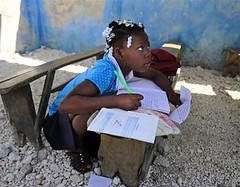
Haiti children to return to school for the first time after the January 12, 2010 earthquake. The eruption caused the deaths of at least 200,000 people and the displacement of three million.
Originally uploaded by Pan-African News Wire File Photos
By Jorge Saenz, AP
Elene attends a math class at the Bom Berger Baptist School, Cite Soleil slum, Port-au-Prince, Monday, April 5. Schools are opening across Haiti's capital for the first time since a devastating earthquake hit nearly three months ago
PORT-AU-PRINCE, Haiti (AP) — The official reopening of schools among the ruins of Haiti's capital brought unbridled joy Monday to students like 12-year-old Moris Rachelle.
After nearly three months on the streets with nothing to do but help her mother look after two younger brothers, Moris wore white ribbons in her hair as she ran, laughed and hugged friends she had not seen since the Jan. 12 catastrophic earthquake.
"All my friends are here," she gushed, smiling broadly. "I'm happy they are not under the rubble."
Registration for the academic year provided a major step toward normalcy for Haiti's children, and offered the first sense for how many of them have survived.
But Haiti's hard-hit education system is just beginning to recover.
MORE: Haiti to use quake rubble in capital's rebuilding
The yard at Moris' public school in the western Carrefour-Feuilles district of Port-au-Prince remained covered with smashed concrete, glass, torn notebook paper. Parents did not want their children to enter a pair of concrete buildings still standing for fear they might give way from damage or an aftershock.
And there was no sign of the tents promised by the Education Ministry in sight, so the school eventually sent all the students home until next Monday.
Only a few hundred schools are expected to open this week in a country where the quake destroyed some 4,000 schools. Many are waiting for tents to teach under because nobody wants to put children back under concrete roofs.
Some community-led learning centers already opened in homeless camps, but there had been no formal education in the capital until Monday, said Edward Carwardine, a UNICEF spokesman in Port-au-Prince. He said it was impossible to say how many schools reopened Monday.
About 40% of schools in the hard-hit southern city of Jacmel have reopened.
At Moris Rachelle's school, as many as 100 of its roughly 1,000 students died in the quake, including some buried in the rubble of an unfinished, six-story hospital that collapsed onto the yard during afternoon classes.
The only way to know for sure who survived was to write down students' names as they filed in Monday. Student council member Chilet Louis, a volunteer registering a line of arrivals in blue school uniforms, said it was his first time back since he helped pull bodies from the rubble that afternoon.
"It's good to see life starting again, but I also knew a lot of the kids who died," said Louis, a 22-year-old high school junior at the public Jean Jacque Dessaline school.
Educators say the regular curriculum will wait while they address the trauma of the disaster.
Administrators took groups of older students aside to talk about the quake. Without any psychologists available, they used a form of group therapy.
One by one, the students stood up and described their experiences of Jan. 12. One girl said she was so startled by the bodies on the streets that she didn't eat, bathe or sleep for two days. Another said she survived only because she left her neighbor's house for an errand a moment before it collapsed, killing everyone inside.
The group applauded after each student spoke.
The magnitude-7 quake that killed a government-estimated 230,000 people left the education system to start from scratch. The Education Ministry and all its records were destroyed, and more than 700 teacher and staff were killed along with an estimated 4,000 students.
Schools are expected to open gradually across the quake zone, with the goal of having 700,000 children back in school by the middle of May, said Mohamed Fall, UNICEF's chief educational official in Haiti. The school year has been extended until August to make up for lost time.
Even before the quake, the system was in disarray. Only half of school-age children were enrolled and the government was unable to support more than a handful of schools, leaving a void filled by for-profit schools with fees that put them beyond the reach of many Haitians.
Many Haitian children leave school to work at a young age. Others are sent by their families to work as servants in more affluent households.
Fall said that as part of the quake recovery, the Haitian government and aid groups are developing strategies to extend education to children who had been excluded.
"We want to build back better," he said.
For now, he said, the immediate priorities are to clear rubble away to make room for classes, assure parents that students will not be kept anywhere near unstable buildings and ensure a minimum of sanitation for children who are often homeless.
Despite the joy of Moris and her classmates, it was a nerve-racking day for parents facing their first separation from their children since the quake.
Moris' mother, 29-year-old Jerline Ceuid, said Moris could have walked on her own from the campsite outside their collapsed home but she wanted to check on the school. She was startled to see only the two single-story concrete schoolhouses.
"If she went into those buildings, I think my heart would stop beating," said Ceuid, who added that she has taught her daughter to avoid unstable buildings in case of aftershocks. "There is still danger."
A bulldozer and frontloader parked outside had cleared a path from the street to the school, but the yard was still covered with rubble, including a pair of dusty children's shoes.
No comments:
Post a Comment